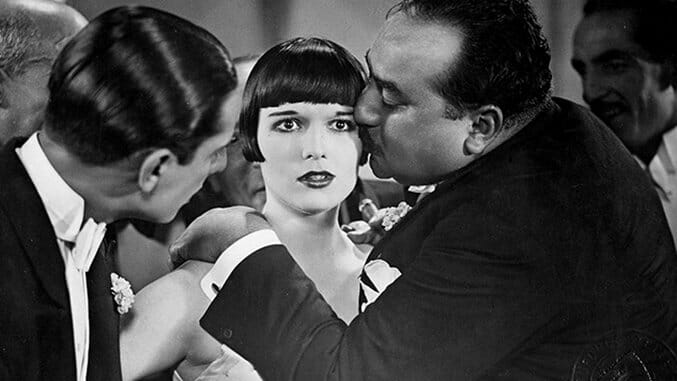Define Frenzy: Queerness in G.W. Pabst’s Pandora’s Box
The first in a series of weekly essays throughout June attempting to explore new queer readings or underseen queer films.

“Define Frenzy” is a series of weekly essays for Pride Month attempting to explore new queer readings or underseen queer films as a way to show the expansiveness of what queerness can be on screen.
Donning an infamous black bob cut, Louise Brooks’ Lulu is chameleonic. She shape-shifts from one archetype to the next, clothed in anything from a white wedding dress to a black veil. She causes frenzied reactions from everyone. She appears on paper and ink drawings, in court rooms and in bedrooms, every one of her actions ambiguous in their motivations. Her relationships, sexual and romantic, balk at usual human logic. Though the men (and sometimes women) in her life are inclined to box her in and define her, Lulu is queer in the most modern sense of the word: She defies categorization, she rejects labels. She is queer—in a broad, fluid, somewhat esoteric sense.
Released in 1929 in the midst of the success of Weimar Germany’s film industry, Georg Wilhelm Pabst’s silent melodrama surveys the rise and fall of dancer, prostitute and seductress Lulu as she wreaks havoc around her, particularly spelling doom for the men in her life. The film, along with Pabst’s Diary of a Lost Girl (also 1929), would catapult the then unknown American actress Louise Brooks to stardom and solidify her as an icon of silent film. Its place within Weimar Cinema is almost part of the film itself: It is a portrait of decadence and downfall, of the other side of hedonism. While much of Weimar Cinema manifested itself via German Expressionism, like F.W. Murnau’s Nosferatu (1927) and Fritz Lang’s Metropolis (1927), Pabst made realist melodramas, known as “street films,” an approach that would inform Pandora’s Box.
We often understand “queer” rigidly, as pertaining to LGBTQ people, or even more conservatively, to gay people. But as queer studies explored and expanded upon ideas, many set forth by such writers as Michel Foucault, of what sexuality and identity mean, today that word has become more expansive, even ideologically inclined. So, Pandora’s Box does technically include an LGBTQ character, but her queerness is not limited to her attraction to/relationship with both men and women. Her queerness is her defiance of a culture and society inclined to see her as the Other. Hers is a body of transcendence.
The easiest exercise to perform while watching GW Pabst’s Pandora’s Box is to attempt to deconstruct Brooks’s character, to analyze to what degree she is worthy of our sympathy, empathy, disdain and disgust. But such analyses rely on a kind of categorization that forces Lulu, and perhaps by extension Brooks, into double binds. She is the temptress sex worker serving Schigolch (Carl Goetz), implicitly “asking for trouble” by her very line of work. Later, she invokes empathy from Jack the Ripper, only to be murdered by him, both justifying, paradoxically, the prudish beliefs of the viewer in the most Hollywood-ish manner possible (despite this being a film from the Weimar Cinema) and engendering real sympathy from the audience at large. How can both be true?
She wears black silk in the court room, her face shaped perfectly by her coifed hair, and testifies like the Black Widow on the stand, tried for manslaughter in the death of Schön (Francis Lederer), her late one-day-old husband. Lulu plays the audience in multiple ways: In a scene where Lulu could so simply be reduced to easily defined archetypes, she eschews them one by one, sometimes subverting the very conventions that she is ostensibly intended to live within.
This includes her relationships, as her feelings towards monogamy seem to be more ambivalent. There is palpable chemistry between Lulu and Countess Augusta Geschwitz (Alice Roberts), an eroticism that is only displayed but never exploited. Geschwitz is chic, not unlike Lulu herself, and their understanding of the illusory appeal of surfaces is undoubtedly a crucial aspect of their dynamic, one Pabst carefully illustrates, further articulating this idea of non-categorization. Geschwitz hands Lulu sketches for a dress—constructed identities on their own—and vies for an intimate connection with her friend, who grants Geschwitz this to some degree. Though one could read Lulu’s confirmation of Geschwitz’s advances as using the relationship to her advantage, the looks and glances the two give one another imply a mutual understanding of how they are to navigate their attraction. Even as Lulu is involved with other relationships (with men), she continues to resist the rigidity of normative frameworks that mean to box her in.
-

-

-

-

-

-

-

-

-

-

-

-

-

-

-

-

-

-

-

-

-

-

-

-

-

-

-

-

-

-

-

-

-

-

-

-

-

-

-

-








































